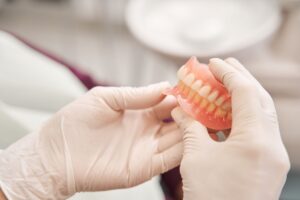
Regardless of how many teeth you’ve lost, your dentist can thankfully rebuild your grin with dentures. These prosthetic teeth form a firm hold against your gums so you can once again chew, talk, and grin more easily. However, your jawbone continues to weaken and shift over time so you might find that one day your restoration doesn’t fit as well as it used to. You may need to have it relined as a result.
If you’re not sure what this means or how it works, keep reading to learn more about it!
What is a Denture Reline?
When your teeth go missing, your body begins to reabsorb bone mass from your jaw that’s no longer necessary to support them. This gradually thins your jawbone which can change its shape enough that your dentures start to slip out of place. When this happens, relining them ensures that they continue to fit and don’t become dislodged. This procedure might also be suggested if the base has become cracked, fractured, or worn down through everyday use.
To make this adjustment, your dentist will apply additional material to the acrylic base that hugs your gums. They apply it as needed to ensure that your artificial teeth can once again form a tight enough bond to remain firmly attached during the day. Usually, it takes between 30 to 60 minutes and may need to be repeated every 1 to 2 years, depending on your provider’s recommendations.
What Are the Types of Denture Relining?
There are two different types of this repair which are intended to be used in different ways. They are:
- Soft reline. This is often used for patients with sensitive mouths who cannot handle a hard material in their mouth. It’s also frequently applied when you’ve just had oral surgery and need prosthetics while you recover. For this type, your dentist uses a pliable silicone material to add to the shape of your denture base because it’s more flexible and comfortable than resin.
- Hard reline. This type is typically used for standard relines and uses resin instead of silicone. The stronger material tends to last longer than soft relines but is not as flexible. It can be performed in-office, or your dentist can take impressions of your mouth and send them to a laboratory to minimize potential complications.
Relining your dentures allows you to continue to make the most of them without requiring that they be replaced altogether!
About the Practice
At DentaCrafters PLLC, two highly qualified dentists offer a full array of services to handle all of your dental needs under one roof. With decades of combined experience, they can handle everything from basic preventative care to more complex procedures. They take the time to get to know you so that they can provide fully individualized treatments and are never too busy to answer any questions you have about your oral health. By combining this personalized approach with state-of-the-art technology, they can quickly assess the problem and create accurate, long-lasting resolutions. If your dentures aren’t fitting well and you need help, you’re welcome to request an appointment on the website or by calling (703) 241-5775.
